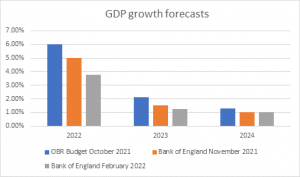“No choice is easy, and no choice is cheap. Whichever option the Chancellor chooses, it will not completely offset the increase in energy costs. Expect political tensions to rise considerably over the following months.”
2 – Will there be a U-turn on national insurance?
“By far the most controversial tax change announced by the government last year was the 1.25 percentage point increase in national insurance contributions, initially to pay for the NHS backlog before being used to fund social care. While 1.25 percentage points may seem small, someone on a £50,000 salary will pay £464 next tax year, or 10% more.
“Given the considerable increase in energy bills, the sky-high fuel prices and eyewatering inflation numbers, many have called for the national insurance rate hike to be delayed or scrapped all-together.
“But a U-turn from the government at the Spring Statement is very unlikely. This is because national insurance is paid by everyone under state pension age, so scrapping the hike would be a saving to everyone regardless of income level. In fact, higher earners would benefit more from the hike being delayed, in pounds and pence terms. It therefore seems likely the government would opt instead for a more targeted fiscal measure, that would have a greater impact on lower-earners and those more vulnerable to energy price hikes.”
3 – Will the high-tax leopard change his spots?
“The UK currently has the largest tax burden since the 1960s, with various rates and reliefs frozen until 2026. According to analysis from the IFS, Rishi Sunak has overseen more tax hikes in his two years in office than Gordon Brown did in 10 years.
“While the Chancellor has tried his hardest to signal to people that his intention is to increase taxes today to lower them tomorrow, the current macroeconomic situation could well derail this plan.
“The working assumption from the Treasury was that solid GDP growth over the next few years would push up government tax receipts and give the Chancellor some fiscal headroom to lower taxes. But forecasts for GDP growth are being revised down as a result of the inflationary pressures in the economy and the disruption caused by Russia’s invasion of Ukraine and the subsequent sanctions.

“Likewise, inflation forecasts are being revised upwards. Given roughly a quarter of government debt is index-linked, the increase in inflation is pushing up the cost of borrowing, which has previously been at very low levels. Successive rate hikes from the Bank of England, which look set to go even higher, will also push up borrowing costs. These dynamics will reduce the headroom available to the Chancellor to lower taxes.
“While it remains to be seen whether there will be enough fiscal headroom for the Chancellor to change his high-tax spots at a later stage, we certainly won’t be getting any tax giveaways at this Statement, so nobody should be getting their hopes up for an unexpected tax break.”














